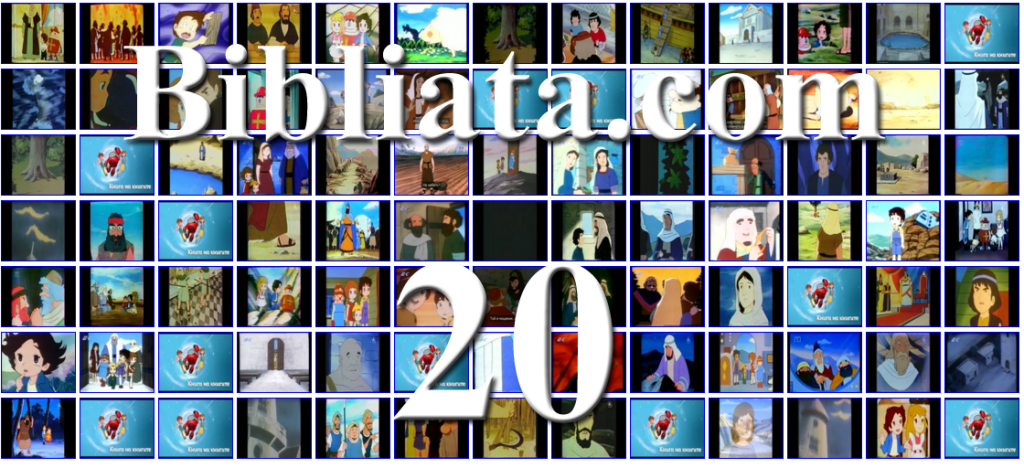Releasing Greek-Bulgarian Interlinear of the New Testament ONLINE
November 1, 2023 by Cup&Cross
Filed under Books, Featured, News, Publication

The day after All Saints Day in Bulgarian is celebrated as the Day of National Awakening. In honor and contribution to the National Awakening, we are proud to release the first Greek-Bulgarian Interlinear of the New Testament ONLINE @ https://evangelieto.com/
Evangelieto.com means The Gospel in Bulgarian and is also a common reference the New Testament texts. This new website is a natural continuation of Bibliata.com – the first Bulgarian Bible online, we released back in the cold winter of 1996.
For Easter 2015, after over eight years of hard work and much difficulties, Cup & Cross Ministries was able to complete and publish the first ever Greek-Bulgarian interlinear based on the Nestle-Aland 28/ UBS-4 texts. This first edition is dedicated to those students of the Bible, who prefer working with the original texts, rather than using the multitude of new Bible revisions often with religious and ideological orientation.
 For the 500th Anniversary of the Protestant Reformation, our Greek-Bulgarian Interlinear of the New Testament was presented in Bulgaria’s capital Sofia on All Saints Day 2017. The Greek Bulgarian Interlinear of the New Testament proposed the following solutions to the translation of the Bible in Bulgarian:
For the 500th Anniversary of the Protestant Reformation, our Greek-Bulgarian Interlinear of the New Testament was presented in Bulgaria’s capital Sofia on All Saints Day 2017. The Greek Bulgarian Interlinear of the New Testament proposed the following solutions to the translation of the Bible in Bulgarian:
1. A non-received text – Textus Haud Receptus
2. Critical Edition of the Greek New Testament alike Revised Textus Receptus, Tischendorf, Westcott and Hort, von Soden, Nestle-Aland, UBS and SBL GNTs
3. Literal translation from Greek made word for word without dynamic equivalents
4. Linguistic paradigm for repetitive parallel permutation structures in the Greek-Bulgarian translation alike form criticism of the Bible
5. Analytical Greek New Testament with complete morphology of the words
This new translation took several years to refine through multiple revisions, re-readings, and new re-translate where needed in order to produce an interlinear with priority advantages and distinctive features as follows:
1. The text is arranged in three lines – Greek original, literal translation and for the first time in a Bulgarian publication, an analytical apparatus with detailed morphology of the words.
2. A brand-new word for word translation, not phrase for phrase or simple imposed text on an already existing translation, challenges the reader into a deeper understanding of the Word.
3. Unnecessary text markers and explanations have been avoided because the parallel stylistics between Greek and Bulgarian are much more similar than other languages even when accompanied with Strong’s numbering.
4. The literal meaning of the text is shown without the dynamic equivalent characteristic of other interlinear editions.
5. All participles/predicates are literally translated avoiding the superimposition of like, as, which, etc., when they are not in the original text.
6. All definite articles are given as in the Greek before the word (not at the end part of the word as it is done in Bulgarian) even in the tradition of Nomina Sacra.
7. Enforced literalism on understandable New Testament terminology such as Lord/Master, church/ecclesia/congregation/gathering/assembly, baptism, etc. is avoided.
8. The literal word for word translation preserves case and gender as possible in over 90% of the New Testament text.
9. The applied critical apparatus in addition to the analytical morphology, includes designation of all verses and passages of critical difference with the Nestle-Aland GNT.
10. Hitherto missing morphology now provided, not only shows why a given word is translated in the chosen way, but enables the reader to navigate through more complex grammatical structures of the Greek language and understand them.
To translate the Bible is like to climb upon top of Mount Everest. You put everything at stake. You spend yourself to the last. You forget the pain and fatigue. You leave behind the unimportant things. You carry only the most important ones. Every breath is for eternity. Every step is last. And so, all the way to the top! The price is unbearable, but the reward is extraordinary. Because there, from the top, you finally see things differently. And it is almost impossible to go back down. Even if you can, down now feels different. And one can only hope others too will climb this peak, to perceive and translate for the next. So, that they too can see. For this reason, our interlinear is by no means the last. It is only a seed, which will bear long lasting fruit. For the generations…

Bibliata.com celebrates 25 years in online ministry by reading through the whole New Testament in one day
One of our first ministry websites, Bibliata.com just celebrated 25 years of ministry online. It began in the fall of 1996 with the sole purpose to reach Bulgarians online with the Bible. We began the Bibliata.com anniversary celebration with an out loud reading through the whole Bulgarian Bible on September 16 involving many churches and Christian communities in Bulgaria and abroad.
After 25 years with several million annual views and visitors, it has become the standard for the Bulgarian Bible online. Through the years, virtually all Bulgarian Bible versions as well as many others in foreign and original tongues were published. Audio Bible, Video Bible, extensive Bible commentary, a national sermon archive, multiple device apps and Bible study platforms are only a few of the projects completed. Additionally, a new Bulgarian translation in the works since 2007 is close to its publication date for the 500th anniversary of the Protestant Reformation. But this is not all…
The story of the Bulgarian Bible online is centered not only in products and projects, but in the very people we work with to create a community of believers, who pray, talk, grow and live together in the footsteps of the Savior. And this is worth much more than just 25 years of work and perseverance…
Bibliata.com celebrates 20 years in ministry online
 One of our first ministry websites, Bibliata.com just celebrated 20 years of ministry online. It began in the fall of 1996 with the sole purpose to reach Bulgarians online with the Bible. We began the Bibliata.com anniversary celebration with an out loud reading through the whole Bulgarian Bible on September 16-18, 2016 involving many churches and Christian communities in Bulgaria and abroad.
One of our first ministry websites, Bibliata.com just celebrated 20 years of ministry online. It began in the fall of 1996 with the sole purpose to reach Bulgarians online with the Bible. We began the Bibliata.com anniversary celebration with an out loud reading through the whole Bulgarian Bible on September 16-18, 2016 involving many churches and Christian communities in Bulgaria and abroad.
After 20 years with several million annual views and visitors, it has become the standard for the Bulgarian Bible online. Through the years, virtually all Bulgarian Bible versions as well as many others in foreign and original tongues were published. Audio Bible, Video Bible, extensive Bible commentary, a national sermon archive, multiple device apps and Bible study platforms are only a few of the projects completed. Additionally, a new Bulgarian translation in the works since 2007 is close to its publication date for the 500th anniversary of the Protestant Reformation. But this is not all…
The story of the Bulgarian Bible online is centered not only in products and projects, but in the very people we work with to create a community of believers, who pray, talk, grow and live together in the footsteps of the Savior. And this is worth much more than just 20 years of work and perseverance…
Online Pentecostal Academic Journals
Asian Journal of Pentecostal Studies (AJPS) – associated with the Asia Pacific Theological Seminary in the Philippines (Assemblies of God Philippines) – volumes from 1998-present – FREE ONLINE
Australasian Pentecostal Studies (APS) – 1999-present – FREE ONLINE
Canadian Journal of Pentecostal-Charismatic Christianity – 2010-present – FREE ONLINE
Cyberjournal for Pentecostal-Charismatic Research – 1997-2013 – FREE ONLINE
Encounter: Journal for Pentecostal Ministry – associated with the Assemblies of God Theological Seminary – volumes from 2004-present – FREE ONLINE
Journal of the European Pentecostal Theological Association (JEPTA) – associated with the European Pentecostal Theological Association – volumes from 1981-present – FREE ONLINE through 2009 / Members access to 2010-present
Journal for Pentecostal Theology (JPT) – volumes from 1992-present – Members access only
The Pentecostal Educator – associated with the World Alliance for Pentecostal Theological Education – volumes 2014-present – FREE ONLINE [FORTHCOMING]
PentecoStudies: Online Journal for the Interdisciplinary Study of Pentecostal and Charismatic Movements – 2004-present – subscription
Pneuma: Journal of the Society for Pentecostal Studies – volumes from 1979-present – Members access only
PneumAfrica: The Online Journal of African Pentecostal Christianity – associated with the Association for Pentecostal Theological Education in Africa – volumes from 2013-present – FREE ONLINE
Pneuma Review – volumes from 1998-present – FREE ONLINE
I have intentionally not included the more pastoral and popular publications: Paraclete (1967-1995), Enrichment Journal (1995-present), or Enrich: A Journal for Pentecostal Ministry.
[CURRENT ON JULY 19, 2014]
Mobile Bible School in Bulgaria Implements Three Online Programs
As our Mobile Bible School demands constant upgrade and the addition of various new modules, we have been able to implement three complete Bible training schools available in the Bulgarian vernacular within our program. They are presented as media resources to the students and now we have been successful in posting them online to a larger audience, which has interest in them. This include church pastors and independent churches, lay ministers and ministry teams, all the way to the common folk who want to learn about the Bible. These three programs have been historically present in Bulgaria since the Fall of the Berlin Wall in 1989 and it is our hope that with their internet presentation they will continue to serve for the purpose of ministry training. They are:
 1. Oasis of Love Bible School which was taught in Bulgaria by American missionary Keith de Mayo and his colleagues in 1990-1994. After the Fall of the Berlin wall, Oasis of Love became the first major ministry training center on a national level in the capital Sofia. Several hundred ministry students finished the school and entered the ministry by 1994. We were blessed to be able to gather the recordings of the lessons and publish them online. (icon)
1. Oasis of Love Bible School which was taught in Bulgaria by American missionary Keith de Mayo and his colleagues in 1990-1994. After the Fall of the Berlin wall, Oasis of Love became the first major ministry training center on a national level in the capital Sofia. Several hundred ministry students finished the school and entered the ministry by 1994. We were blessed to be able to gather the recordings of the lessons and publish them online. (icon)
 2. The School of Christ International directed by Rev. B.H. Clendennen (May 22, 1922 – December 13, 2009) was introduced in Bulgaria around 2000-2001 and for a brief time received great attention, especially among the Roma Gipsy churches of Southwestern Bulgaria. It introduced a new approach to Bible training through media resources, which were flexible to present and easy to replicate in the local church, thus becoming an important training device for the ministry in the Bulgarian context. (icon)
2. The School of Christ International directed by Rev. B.H. Clendennen (May 22, 1922 – December 13, 2009) was introduced in Bulgaria around 2000-2001 and for a brief time received great attention, especially among the Roma Gipsy churches of Southwestern Bulgaria. It introduced a new approach to Bible training through media resources, which were flexible to present and easy to replicate in the local church, thus becoming an important training device for the ministry in the Bulgarian context. (icon)
 3. International School of Ministry (ISOM) is a largely recognized training tool for churches around the globe. It comprises the teachings of leading ministers and renowned theologians, who have gathered together in one team to impart to a next generation what they have learned about the ministry. The chosen theme series covers virtually every aspect of Christian ministry and are invaluable training tools for both ministers and members within the local church (icon)
3. International School of Ministry (ISOM) is a largely recognized training tool for churches around the globe. It comprises the teachings of leading ministers and renowned theologians, who have gathered together in one team to impart to a next generation what they have learned about the ministry. The chosen theme series covers virtually every aspect of Christian ministry and are invaluable training tools for both ministers and members within the local church (icon)
Ethics of Online Counseling
by Kathryn DonevWe live in a fast-paced society where virtually everything is just a click away. With the click of a button, you can pay your bills or even have merchandise shipped to your front door without ever leaving the comforts of home. The Internet has made this and much more a reality. The number of Internet users today is reported at 972,828,001, which is 15.2% of the world’s population and the percentage of population usage growth during 2000-2005 was reported at 169.5% (Internet World Stats, 2005). As the number of Internet users across the globe continues to soar, more and more resources are becoming accessible online. The possibilities of services that can be offered on the Internet are endless. Today, one can even receive online professional services such as counseling.
Online counseling is a relatively new service. Therefore, there currently exists limited research to support or disconfirm its effectiveness. The long-term ramifications of such an experience are yet unknown. There are many concerned with the ethical dilemmas associated with online counseling. Below I will briefly explore the ethical issues centered around online counseling, beginning with a definition of a traditional counseling relationship:
A traditional counseling relationship is an interpersonal relationship between a client and counselor in which the counselor provides the client a reflection of the client’s self in a safe atmosphere in which the client feels comfortable enough to completely relay information to the counselor in order to gain order over personal conflicts.
Confidentiality:
The first and most obvious ethical dilemma with rendering mental health services over the Internet is one of confidentiality and privacy. The Internet is an open network and therefore is not secure. Consequently, when communicating through an insecure source one cannot be completely guaranteed that what is being revealed in a counseling relationship remains only in that relationship.
Because the Internet is not secure, there are numerous opportunities for an invasion of privacy. Such could occur if one were receiving counseling while at the work place where his or her email is subject to being read because it is considered company property. Other possibilities include, but are not limited to, that another could access confidential emails intentionally by eavesdropping or unintentionally if information was misdirected and intercepted.
Identification:
Another ethical issue associated with online counseling involves client and counselor identification. Without being able to confirm the identity of a client during each interaction, one cannot be certain of who is being counseled. The danger in this circumstance is that one could easily misrepresent him or herself and the counselor could be mislead to believe that he or she is counseling a particular individual when in fact this may not be the case. If this were to happen, confidential information could be unintentionally divulged to a third party.
Additionally, if the client were to misrepresent his or her own identity, for instance their sex or ethnicity, this could be just as damaging and could hinder the counseling process. If a counselor does not fully know with whom he or she is working, then the story which is being revealed by the client cannot appropriately be put into context, thus resulting in misinterpretation of what the client is communicating.
Virtual Relationship:
One of the most common negative results of interacting online is the phenomenon of being in a virtual relationship. Both the counselor as well as the client are in a sense unreal, they are simply “cyber-beings” as the author likes to describe them. Being in a virtual relationship causes an individual to have no sense of commitment to the counseling process. The client is simply writing another email via a keyboard and has minimum personal connection to the counselor.
Due to the lack of a personal relationship with the counselor, a client may be more easily offended by the advice that is given in an online counseling session. A client may feel that a cyber-being has no right to become so personal. If this is the case, then a client may also be more apt to end the relationship either temporarily or permanently by simply clicking a button.
The first and foremost responsibility of a counselor is to protect the welfare of his or her client. Yet, if one is counseling a virtual person then it is nearly impossible to be able to ensure the client’s safety. A counselor does not even truly know whom they are counseling or the location of the client’s residence. With this being the case, a counselor cannot intervene if a client is a danger to him or herself or others. A counselor’s hands are tied when it comes to his or her “Duty to Warn.”
Dishonesty:
As a result of communicating over an insecure source to a cyber-being, a client receiving online services may not be willing to be straightforward about all information. Additionally, when information is shared with a lack of commitment to the counseling process this could lead the client to actually falsify information. Not only is there a danger that a client might be misleading or may even lie, but there is also the risk that a client could intentionally leave out parts of his or her story. A client may feel the need to be deceitful due to the fact that he or she may fear a breach of confidentiality or simply feel no responsibility to be honest because no personal relationship exists between counselor and client. If this is the case, then the counselor cannot work at full capacity because of a lack of all the pieces of the client’s history.
Dishonesty leads to confusion which makes the counseling process difficult if not impossible. If a client were able to be assured that what is said would stay only between counselor and client, then there would be more freedom to be completely honest. Also, if a client were in a face-to-face relationship, they may perhaps feel more of an obligation to be upfront.
Lack of Nonverbals:
Nearly 94 percent of all communication is nonverbal. We communicate with our facial expressions, posture, eye contact and so forth. Needless to say, reading nonverbals is an essential element of counseling. If one is being counseled online, these nonverbals are unobservable and such is detrimental to the counseling process. Nonverbals which cannot be observed during an online session are nervous behaviors, whether eye contact is maintained, angle and distance of body in relationship to the counselor, etc. Also, a client may be typing content which appears to be uplifting, but at the same time may be crying. Conversely, a client may be typing distraught messages but may be laughing while doing so. Such is evident of inappropriate affect and is a good indicator of possible mental diagnoses.
Abandonment Issues:
Another responsibility of the counselor is to not abandon a client. Yet, abandonment may be impossible to avoid when counseling occurs online due to the instability of the Internet. Communication could be hindered because of technology failures or glitches or as a result of a poor Internet connection.
If a relationship is suddenly ended for any reason, it would be almost, if not, impossible for a counselor to get back in touch with his or her client due to the fact that in an online counseling relationship the client is anonymous in most of the cases; thus making abandonment impossible to avoid. Furthermore, if a client were to abruptly leave a counseling session after threatening to harm him or herself or others, then not having the ability to protect your client would be the ultimate case of abandonment.
Conclusion:
There appears to be many “ifs” in the ethical dilemma of online counseling and not enough certainty. “If” we as counselors could guarantee the privacy of our clients, “if” we could make certain of who we are counseling, “if” our client is completely truthful and “if” we were guaranteed they would not terminate before a session is over, then there would be little debate over whether online counseling should be attempted. Nevertheless, as of now, the “ifs” do exist.
Counseling, whether online or in person, involves much responsibility. When counseling an individual, you are placed in a position where you are a major influence in that person’s life. A counselor holds much control over the mental health of another. If Internet counseling is attempted, it should only be done by a competent professional who is well-educated in the field and should only be done via secure websites or with an encryption technological e-mail communication application.Counseling online is a great responsibility as is counseling an individual face to face. As well, such a relationship should be treated with the highest ethical professionalism. Regardless of that an online client is communicating in a virtual world, his or her problems are still very much real.
Reference:
Internet World Stats (2005). Usage and Population Statistics, downloaded from http://www.Internetworldstats.com/stats.htm on 12/2/05. 10 a.m.









